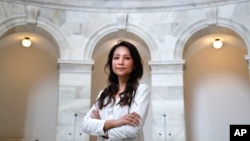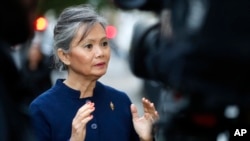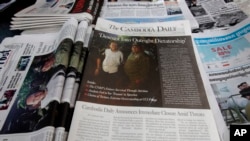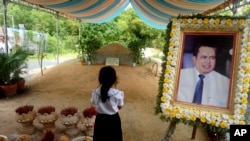Kem Monovithya, a Cambodian political activist, was visiting Switzerland in September when she got a phone call from her father. Kem Sokha, the leader of Cambodia’s main opposition party, told his daughter that government agents were raiding their family’s home in Phnom Penh.
“He told me: ‘They’re handcuffing me now,’” Kem Monovithya, 36, recalled in an interview with The Associated Press.
Months later, her father remains in prison, facing charges of treason, and she is in the United States.
She said she can’t go home because she fears she, too, will be arrested as part of a government crackdown that has banned the political party her father led, shut down news outlets and scattered hundreds of Cambodian politicians, human rights activists, and journalists into exile in the U.S., Australia, Thailand and other countries.
Prime Minister Hun Sen’s ruling party, the Cambodian People’s Party, has stepped up actions against media organizations and opposition politicians over the past two years as national elections — which are set for Sunday — have drawn closer.
Hun Sen, who had held power for three decades, vowed last year that he’d be willing to “eliminate 100 to 200 people” to protect the nation’s security, suggesting his opponents “prepare coffins.”
Spokespeople for the ruling party and the government did not answer questions from the AP for this story.
In February, the government issued a 132-page book that asserted that “real democracy is not being reversed ... On the contrary, only fake democracy is being uprooted.”
The international watchdog group Human Rights Watch says the “civil and political rights environment in Cambodia” has “markedly deteriorated” since the start of 2017. The group says the regime has engaged in “arbitrary arrests and other abuses” and worked to portray peaceful dissent over corruption, land rights and other issues as attempts to overthrow the government.
Kem Monovithya and other exiled members of the banned Cambodia National Rescue Party are keeping the party alive from abroad. They are trying to convince the U.S., the European Union, and others to place an embargo on international travel by top Cambodian officials, but avoid a general economic embargo that would hurt average Cambodians.
They are also asking voters to boycott this month’s elections, using social media to urge Cambodians to embrace a “clean finger campaign.” In Cambodia, voters must dip their fingers in ink after casting their ballots.
The National Election Committee warned that anyone urging a boycott or otherwise interfering in the polls could face criminal charges.
‘Beyong Words’
Kem Monovithya and other exiles have traveled around the U.S. and to Europe, Australia, New Zealand and elsewhere to spread their message, talking with diplomats, lawmakers, media and Cambodians living abroad.
As they advocate for change from afar, Cambodia’s political exiles are also struggling with a sense of loss and dislocation.
“I miss my family, my kids,” said Sia Phearum, a Cambodian land rights activist who fled the country for the U.S. in late 2017, leaving behind his wife and three children, ages 5 to 11. “The pain is beyond words.”
Kem Monovithya told the AP that her exile is “a test of my strength and endurance. I am almost homeless.” She stays with friends and she isn’t sure where she’ll be from week to week. “I go where my advocacy takes me,” she said.
A month after her father’s arrest, one of his deputy party leaders, Mu Sochua, was tipped off by two government officials that she was also going to be arrested. Mu Sochua, 64, said she wanted to stay, but her children convinced her that she should she leave the country and work from abroad for democracy in Cambodia.
In late May, Mu Sochua and Kem Monovithya traveled to Norway to attend the Oslo Freedom Forum, a gathering of human rights and democracy advocates.
In a speech at the forum, Mu Sochua urged the international community to impose sanctions “on those who are engaging in the oppression” in Cambodia.
“The democracies of the world should not recognize a government from an illegitimate election,” she said.
The U.S. has expressed “grave concern” about the Cambodian government’s actions and questioned whether this month’s elections will be free and fair. In March, the Trump White House said it was withholding $8.3 million in funding for Cambodia’s government as part of an effort “to ensure that American taxpayer funds are not being used to support anti-democratic behavior.” The EU has threatened a trade embargo and Germany has restricted travel visas for Cambodian government officials.
Japan has continued to provide funding to help underwrite the general election. Exiled Cambodian opposition leaders have appealed to the Japanese government to withdraw the funding.
Cambodian authorities claim that opposition leaders, community activists, and journalists are working with the U.S. and other “superpowers” to bring down the government. Hun Sen and other government officials use the term “color revolution” to describe these efforts.
“All armed forces are obliged to absolutely ensure that Cambodia is free from any color revolutions,” Hun Sen wrote in a Facebook post in 2016. “Such a revolution will harm people’s happiness and peace in Cambodia. Armed forces shall protect the legitimate government.”
‘Authority of the State'
Despite the cooling of its relations with the U.S., the Cambodian government has cited Donald Trump’s attacks on what he calls “the fake news media” as justification for tighter controls on journalism in Cambodia.
“President Donald Trump thinks that the news reported by these organizations did not reflect the truth, which is the responsibility of the professional reporters,” a Cambodian government spokesman said in a statement weeks after Trump’s inauguration. “This means that freedom of expression must respect the law and the authority of the state.”
In September, the Cambodia Daily, an English language newspaper known for its aggressive reporting on corruption and abuses of power, announced it had been forced to close as the result of what it said were “extra-legal threats” and a sham tax bill from the government.
The paper’s final front page included the headline “Descent Into Outright Dictatorship” — and the news that Kem Monovithya’s father, Kem Sokha, had been arrested and charged with conspiring with the U.S. to overthrow Hun Sen’s government. Hun Sen publicly called Kem Sokha a “foreign puppet.”
In May, the Phnom Penh Post, which was considered the last independent daily in Cambodia, was purchased by a businessman who is chief executive of a public relations firm that has worked for Hun Sen’s government. After the sale, several top journalists at the paper were fired or resigned.
The government has also closed about 20 radio channels and arrested two former reporters with U.S.-backed Radio Free Asia. The journalists, Uon Chhin and Yeang Southearin, were initially accused of running an “unlicensed karaoke studio” but were later charged with providing a “foreign state with information which undermines national defense.”
These troubles are the latest in a country that has endured genocide, civil war, and oppression over the past half-century. Nearly 2 million Cambodians died in the “killing fields” operated by the Khmer Rouge, the communist regime that controlled the country from 1975 to 1979. Hun Sen took power as Cambodia’s prime minister in 1985, but violence between competing factions continued until a peace accord was signed in Paris in 1991.
Over the past decade or more, citizen protests have proliferated over land rights, widespread logging in Cambodia’s forests and working conditions in the country’s garment factories. In response, the government has arrested dozens of protest leaders, convicting some in court proceedings that Human Right Watch said: “failed to meet even the most rudimentary fair trial standards.”
Sia Phearum, the land rights activist, said “the powerful and the rich” profit from development and land grabs while poor people get little compensation for their losses.
“The government and the companies are doing business together,” he said. “When you hear of a place being developed, there will be tears and suffering.”
‘Tigers and Snakes'
Some observers trace the regime’s increased efforts to curb dissent to the killing of Kem Ley, a political commentator, and critic of the regime. He was gunned down in Phnom Penh in 2016 — two days after he spoke on radio about a report by the watchdog group Global Witness examining the wealth that Hun Sen’s family has accumulated.
His death was widely seen as a politically motivated murder. Throngs of people took to the streets to join his funeral procession. Opposition politicians believe the turnout surprised the government.
Kem Ley’s widow, Bou Rachana, had never been involved in politics, but since her husband’s murder, she has begun speaking out about her country’s political and social ills. She left Cambodia and was granted asylum in Australia earlier this year.
“I could not live in a country full of tigers and snakes,” she told AP.
Some exiles believe that the results of the country’s district elections in June 2017 further increased fears within the ruling party that it was in danger of losing its grip on power. The Cambodia National Rescue Party won nearly 44 percent of the seats, while the ruling party won less than 51 percent.
The government arrested Kem Monovithya’s father three months later. Then in November, the country’s Supreme Court upheld the government’s demand that Cambodia National Rescue Party be dissolved. The ruling banned more than 100 senior party officials from being involved in politics for five years.
“We’ve lost everything. We don’t have the party anymore,” Kem Monovithya said. “Our country is in darkness.”
She has spent most of her time in Washington, D.C. since her father’s arrest. She breaks down into tears, she said, whenever other émigrés ask about him.
She got involved in politics as a teenager in 1993 during the country’s first national elections. She traveled the campaign trail with her dad, who won a seat in the legislature. She talked to voters one on one and distributed leaflets outlining his platform.
“We all saw this as the beginning of many great things to come,” she recalled. “People believed in the process because it was administered by the UN.”
Hun Sen’s political rivals won the vote, but he refused to give up power. He and his opponents agreed to a power-sharing arrangement, but Hun Sen wrested back full power in a military coup in 1997.
Kem Monovithya later worked for United Nations agencies and human rights groups in Cambodia and at the World Bank’s headquarters in Washington.
Her father was arrested by the government for the first time in 2006. At the time she was on a plane to the U.S. to drop her younger sister off at college. She led an effort that helped prompt the release of her father and other political prisoners.
That first time he was arrested, she said, he was allowed, visitors. Back then, she said, influence from the U.S. and other Western donors helped soften the government’s stance against critics. Now, as China has increased its investment and influence, the Cambodian government is less concerned about international opinion, she said.
This time, she said, no one is allowed into the jail to see him. She worries because her father, 65, has health problems that could be worsened by incarceration.
She doesn’t know when she’ll be able to see him or return to Cambodia. But she said she will find a way.
“I have to go back home, and I will not give up the fight,” she said. “It’s our country. We cannot allow a small group of people to kick us out of the country forever.”










